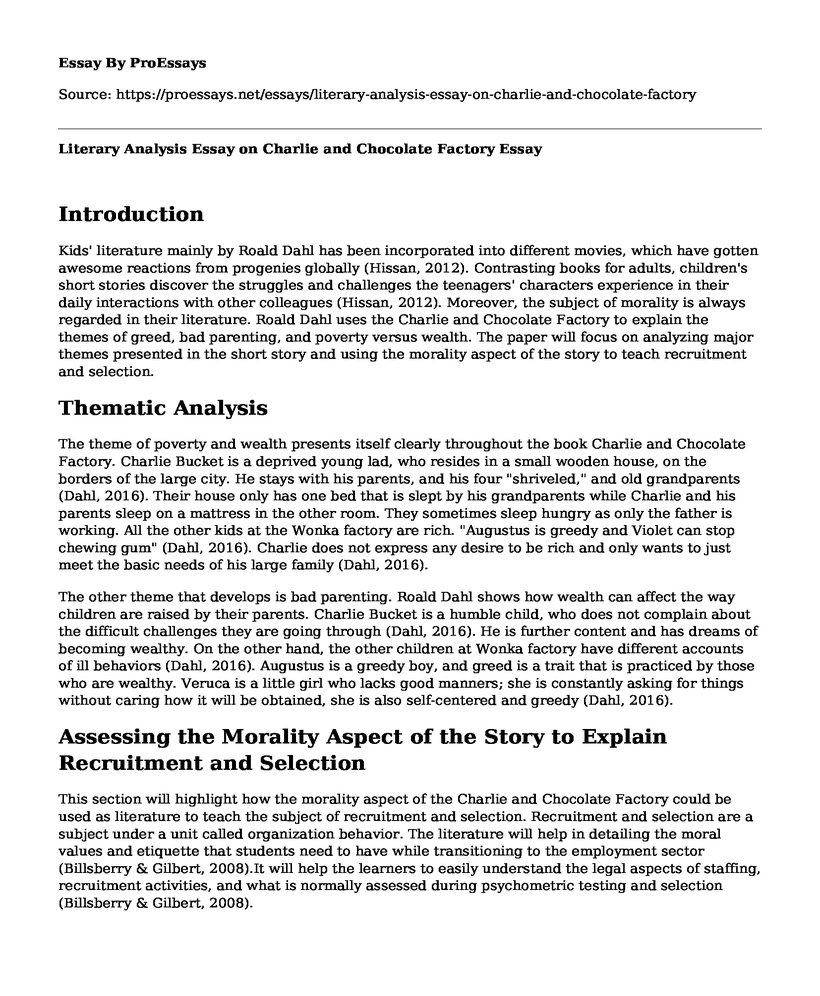Introduction
Kids' literature mainly by Roald Dahl has been incorporated into different movies, which have gotten awesome reactions from progenies globally (Hissan, 2012). Contrasting books for adults, children's short stories discover the struggles and challenges the teenagers' characters experience in their daily interactions with other colleagues (Hissan, 2012). Moreover, the subject of morality is always regarded in their literature. Roald Dahl uses the Charlie and Chocolate Factory to explain the themes of greed, bad parenting, and poverty versus wealth. The paper will focus on analyzing major themes presented in the short story and using the morality aspect of the story to teach recruitment and selection.
Thematic Analysis
The theme of poverty and wealth presents itself clearly throughout the book Charlie and Chocolate Factory. Charlie Bucket is a deprived young lad, who resides in a small wooden house, on the borders of the large city. He stays with his parents, and his four "shriveled," and old grandparents (Dahl, 2016). Their house only has one bed that is slept by his grandparents while Charlie and his parents sleep on a mattress in the other room. They sometimes sleep hungry as only the father is working. All the other kids at the Wonka factory are rich. "Augustus is greedy and Violet can stop chewing gum" (Dahl, 2016). Charlie does not express any desire to be rich and only wants to just meet the basic needs of his large family (Dahl, 2016).
The other theme that develops is bad parenting. Roald Dahl shows how wealth can affect the way children are raised by their parents. Charlie Bucket is a humble child, who does not complain about the difficult challenges they are going through (Dahl, 2016). He is further content and has dreams of becoming wealthy. On the other hand, the other children at Wonka factory have different accounts of ill behaviors (Dahl, 2016). Augustus is a greedy boy, and greed is a trait that is practiced by those who are wealthy. Veruca is a little girl who lacks good manners; she is constantly asking for things without caring how it will be obtained, she is also self-centered and greedy (Dahl, 2016).
Assessing the Morality Aspect of the Story to Explain Recruitment and Selection
This section will highlight how the morality aspect of the Charlie and Chocolate Factory could be used as literature to teach the subject of recruitment and selection. Recruitment and selection are a subject under a unit called organization behavior. The literature will help in detailing the moral values and etiquette that students need to have while transitioning to the employment sector (Billsberry & Gilbert, 2008).It will help the learners to easily understand the legal aspects of staffing, recruitment activities, and what is normally assessed during psychometric testing and selection (Billsberry & Gilbert, 2008).
The Charlie and Chocolate Factory story was conceptualized by the author after numerous visits at a Cadbury firm, where he was tasked with the role of "taste tester" on new brands of chocolate. During the tour, the kids are carved away, and only Charlie remains (Billsberry & Gilbert, 2008). After carefully scrutinizing the candidates, Wonka declares Charlie as the new manager of the company (Billsberry & Gilbert, 2008).
Charlie and Chocolate Factory has not clearly depicted how the recruitment and selection process occurs in most firms; However, it is a good teaching instrument to explain the importance of having the right moral values. In the book, Wonka's selection concept is centered on the notion that the incumbent thrives based on his or her creativity, inventiveness, and innovation (Billsberry & Gilbert, 2008).
Conclusion
The review of Charlie and Chocolate Factory has delved into two parts; thematic analysis and how the morality aspect of the book can be used as a teaching instrument of recruitment and selection topic for business students. The two themes that have been explained include; theme of poverty and wealth and theme of bad parenting. It is clear that Wonka's selection idea is centered on the conception that the new employee will achieve through creativity, inventiveness, and novelty. Therefore, the decision of placing Charlie at the management role is primarily based on his unique character.
References
Billsberry, J., & Gilbert, L. H. (2008). Using Roald Dahl's Charlie and the Chocolate Factory to teach different recruitment and selection paradigms. Journal of Management Education, 32(2), 228-247. Retrieved from: file:///C:/Users/User/Downloads/Using_Roald_Dahls_Charlie_and_the_Chocolate_Facto.pdf
Dahl, R. (2016). Charlie and the chocolate factory. Penguin.
Hissan, W. S. M. (2012). An Analysis of the Children's Characters in Roald Dahl's Novel: Charlie and the chocolate factory. Indonesian Journal of Applied Linguistics, 2(1), 82-92. Retrieved from: file:///C:/Users/User/Downloads/An_analysis_of_the_childrens_characters_in_Roald_.pdf
Cite this page
Literary Analysis Essay on Charlie and Chocolate Factory. (2023, Mar 03). Retrieved from https://proessays.net/essays/literary-analysis-essay-on-charlie-and-chocolate-factory
If you are the original author of this essay and no longer wish to have it published on the ProEssays website, please click below to request its removal:
- Some Questions on A Streetcar Named Desire
- The Existentialism Philosophy by Jean Paul Sartre on the Example of The Death of a Salesman
- Because I Could Not Stop for Death - Essay on Poem Analysis
- Analysis Essay on Poe's "The Cask of Amontillado"
- Literary Analysis Essay on the Names by Scott Momaday
- Machiavelli's 'The Prince' - Essay Sample
- Essay Example on Ernest Hemingway's Sun Also Rises & A Farewell to Arms







